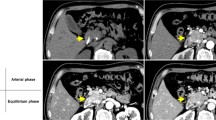Abstract
Background: Well-differentiated neuroendocrine tumors are treated primarily with somatostatin analogs and interferon-α. It is not clear what therapy should be applied after failed biotherapy. Our aim was to establish whether patients whose tumors rapidly progress under biotherapy may benefit from chemotherapy.
Patients and Methods: In 10 patients with metastatic neuroendocrine tumors (4 foregut, 3 midgut, 1 retroperitoneal, and 2 of unknown origin) streptozotocin and doxorubicin were used as second-line or third-line therapy. Tumor response was assessed by computed tomography of the abdomen and thorax and measurement of tumor secretion products (serum chromogranin A, urinary 5-hydroxyindoleacetic acid).
Results: Three patients showed a radiological response over a mean time of 30 mo (range: 7–67 mo). Median survival after initiation of chemotherapy was 50 mo in patients with a response and 8 mo in non-responders. Three patients developed major side effects (nephrotoxicity, diabetes, and encephalopathy).
Conclusion: Streptozotocin and doxorubicin produce poor response rates in patients with progressive neuroendocrine tumors after failed biotherapy, but may prolong life in those patients who show a tumor response.
Similar content being viewed by others
References
Rougier P, Ducreux M. Systemic chemotherapy of advanced digestive neuroendocrine tumors. Ital J Gastroenterol Hepatol 1999;31(Suppl 2):202–206.
Moertel CG. Karnofsky memorial lecture. An odyssey in the land of small tumors. J Clin Oncol 1987;5:1502–1522.
Öberg K. The use of chemotherapy in the management of neuroendocrine tumors. Endocrinol Metab Clin North Am 1993;22:941–952.
Bukowski RM, Johnson KG, Peterson RF, et al. A phase II trial of combination chemotherapy in patients with metastatic carcinoid tumors. A Southwest Oncology Group Study. Cancer 1987;60:2891–2895.
Engstrom PF, Lavin PT, Moertel CG, Folsch E, Douglass HO, Jr. Streptozocin plus fluorouracil versus doxorubicin therapy for metastatic carcinoid tumor. J Clin Oncol 1984;2:1255–1259.
Rougier P, Oliveira J, Ducreux M, Theodore C, Kac J, Droz JP. Metastatic carcinoid and islet cell tumors of the pancreas: a phase II trial of the efficacy of combination chemotherapy with 5-fluorouracil, doxorubicin and cisplatin. Eur J Cancer 1991;27:1380–1382.
Kvols LK. Metastatic carcinoid tumors and the carcinoid syndrome. A selective review of chemotherapy and hormonal therapy. Am J Med 1986;81:49–55.
Kvols LK, Moertel CG, O’Connell MJ, Schutt AJ, Rubin J, Hahn RG. Treatment of the malignant carcinoid syndrome. Evaluation of a long-acting somatostatin analogue. N Engl J Med 1986;315:663–666.
Öberg K, Eriksson B, Janson ET. Interferons alone or in combination with chemotherapy or other biologicals in the treatment of neuroendocrine gut and pancreatic tumors. Digestion 1994;55(Suppl 3):64–69.
Grander D, Sangfelt O, Erickson S. How does interferon exert its cell growth inhibitory effect? Eur J Haematol 1997;59:129–135.
Liebow C, Reilly C, Serrano M, Schally AV. Somatostatin analogues inhibit growth of pancreatic cancer by stimulating tyrosine phosphatase. Proc Natl Acad Sci USA 1989;86:2003–2007.
Arnold R, Simon B, Wied M. Treatment of neuroendocrine GEP tumors with somatostatin analogues: a review. Digestion 2000;62(Suppl 1):84–91.
Faiss S, Pape UF, Bohmig M, et al. Prospective, randomized, multicenter trial on the antiproliferative effect of lanreotide, interferon alfa, and their combination for therapy of metastatic neuroendocrine gastroenteropancreatic tumors—the International Lanreotide and Interferon Alfa Study Group. J Clin Oncol 2003;21:2689–2696.
Leong WL, Pasieka JL. Regression of metastatic carcinoid tumors with octreotide therapy: two case reports and a review of the literature. J Surg Oncol 2002;79:180–187.
Moertel CG, Lefkopoulo M, Lipsitz S, Hahn RG, Klaassen D. Streptozocin-doxorubicin, streptozocin-fluorouracil or chlorozotocin in the treatment of advanced islet-cell carcinoma. N Engl J Med 1992;326:519–523.
Bender H, Maier A, Wiedenmann B, O’Connor DT, Messner K, Schmidt-Gayk H. Immunoluminometric assay of chromogranin A in serum with commercially available reagents. Clin Chem 1992;38:2267–2272.
Mitry E, Baudin E, Ducreux M, et al. Treatment of poorly differentiated neuroendocrine tumors with etoposide and cisplatin. Br J Cancer 1999;81:1351–1355.
Moertel CG, Kvols LK, O’Connell MJ, Rubin J. Treatment of neuroendocrine carcinomas with combined etoposide and cisplatin. Evidence of major therapeutic activity in the anaplastic variants of these neoplasms. Cancer 1991;68:227–232.
Öberg K. Advances in chemotherapy and biotherapy of endocrine tumors. Curr Opin Oncol 1998;10:58–65.
Kelsen DP, Cheng E, Kemeny N, Magill GB, Yagoda A. Streptozotocin and adriamycin in the treatment of APUD tumors (carcinoid, islet cell and medullary carcinoma of the thyroid). Proc Am Assoc Cancer Res 1982;23:111.
Öberg K. Neuroendocrine gastrointestinal tumors- a condensed overview of diagnosis and treatment. Ann Oncol 1999;10(Suppl 2):3–8.
Amarapurkar AD, Davies A, Ramage JK, Stangou AJ, Wight DG, Portmann BC. Proliferation of antigen MIB-1 in metastatic carcinoid tumors removed at liver transplantation: relevance to prognosis. Eur J Gastroenterol Hepatol 2003;15:139–143.
Sokmensuer C, Gedikoglu G, Uzunalimoglu B. Importance of proliferation markers in gastrointestinal carcinoid tumors: a clinicopathologic study. Hepatogastroenterology 2001;48:720–723.
Marty-Ane CH, Costes V, Pujol JL, Alauzen M, Baldet P, Mary H. Carcinoid tumors of the lung: do atypical features require aggressive management? Ann Thorac Surg 1995;59:78–83.
Wang DG. Apoptosis in neuroendocrine tumors. Clin Endocrinol (Oxf) 1999;51:1–9.
Fjällskog ML, Granberg DP, Welin SL, et al. Treatment with cisplatin and etoposide in patients with neuroendocrine tumors. Cancer 2001;92:1101–1107.
Author information
Authors and Affiliations
Corresponding author
Rights and permissions
About this article
Cite this article
Pavel, M.E., Baum, U., Hahn, E.G. et al. Doxorubicin and streptozotocin after failed biotherapy of neuroendocrine tumors. Int J Gastrointest Canc 35, 179–185 (2005). https://doi.org/10.1385/IJGC:35:3:179
Issue Date:
DOI: https://doi.org/10.1385/IJGC:35:3:179




